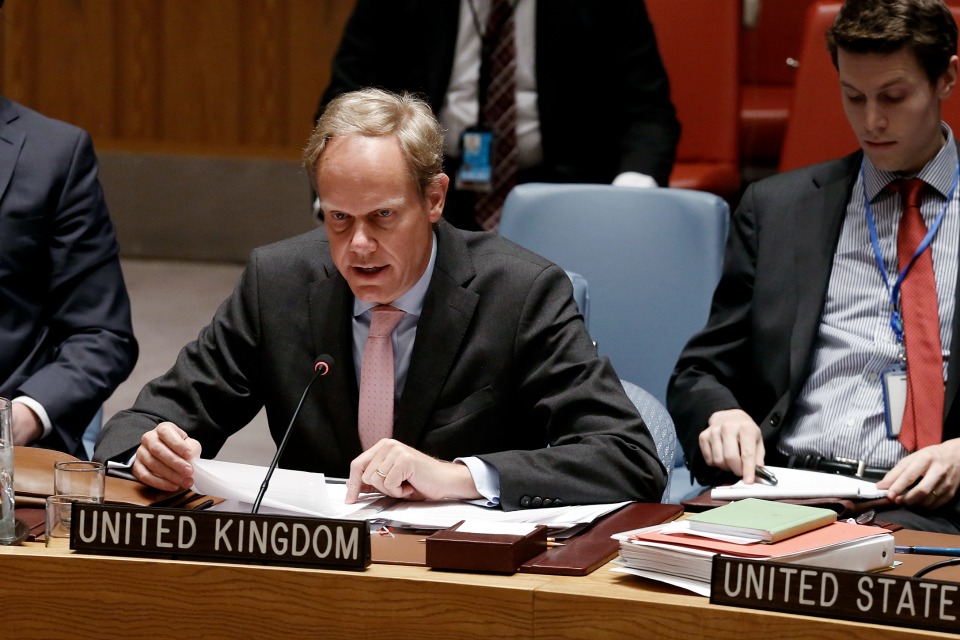"The United Kingdom supports an ambitious review of the UN global counter terrorism strategy."
Statement by Ambassador Matthew Rycroft of the UK Mission to the UN at the Security Council Briefing by Subsidiary bodies on Counter Terrorism.

Thank you, Mr President, I want to begin by thanking the three briefers, not just for their briefing but for all of their hard work on our collective behalf in chairing the committee, so thank you very much Gerard, Amr, and Román.
It has been a decade since the General Assembly unanimously adopted the UN Global Counter Terrorism Strategy. In that time the UN has developed a comprehensive architecture to counter terrorism. At our disposal we have sanctions and analysis; we have coordination from the Counter Terrorism Implementation Task Force; and we have project delivery by the Counter Terrorism Centre.
But in that decade, the threat has changed. The spectre of Daesh now hangs over so many of the crises that we deal with in this chamber. Groups like Boko Haram terrorise some of the world’s poorest people. And the Al Qaida network has spread to fragile regions across the globe.
So I hope that we can use the 10 year anniversary of the UN strategy to adapt to this new reality, to refresh the framework, and to lay the foundations for another decade of effective support to member states as we tackle this scourge together.
I’d like to touch on two aspects of the current threat in particular.
First, as many colleagues have noted, Daesh remains a major threat to international peace and security. The United Kingdom is taking action against them within the Counter-Daesh coalition and other fora. Significant gains have been made.
Daesh is now less able to finance their hate, less able to carry out their terror and less able to recruit followers to their sick cause. We must sustain this pressure.
UN bodies play a vital supporting role in this effort. The Daesh/Al Qaeda sanctions regime is tightening the noose on Daesh finance and UN panel assessments offer timely recommendations for states to address gaps in their national systems. We look to all states to fulfil their obligations under UN sanctions.
On foreign terrorist fighters, the Counter Terrorism Executive Directorate is helping map and understand recruitment flows. We share, and welcome, the assessment that numbers travelling to fight for Daesh have slowed, but new trends are now emerging.
These include increased numbers of returnees, but also so-called broken travel but also as Gerard said– broken travel, travelling with multiple documents via multiple destinations, to circumvent security. These shifts show we cannot be complacent. The UN must facilitate the sharing of best practice and lessons learnt in this area.
Mr President.
The second threat I want to touch upon is proliferation to non-state actors, especially terrorists. Resolution 1540 is all about preventing the worst case scenario - toxic, poisonous or radioactive materials falling into the hands of terrorists. Full, universal implementation of this resolution by all states would go quite some way to preventing this deadly proliferation. This universal ideal is being challenged. Continued allegations of chemical weapons use in Syria and Iraq are exactly what Resolution 1540 and the Chemical Weapons Convention were designed to stop. These are horrific crimes. All investigations aimed at bringing to justice those responsible for acquisition, development, manufacture or use of chemical weapons must be pursued rigorously. Ultimately, prohibited chemical weapons cannot fall into terrorist hands if they have been destroyed in line with international law. That is why all governments in the region should join without delay the Chemical Weapons Convention, and all existing signatories must unequivocally fulfil their obligations, including full cooperation with OPCW assessments and fact finding missions.
Looking forward, the Comprehensive Review of 1540 this summer is an opportunity to strengthen our collective security on this issue. We should be bold. Areas for improvement could include:
- strengthened regional cooperation, as neighbouring states are best placed to help each other;
- greater understanding of emerging proliferation challenges - because we need to keep pace with new technology;
- and well-resourced and structured secretariat support, so that the Committee can fulfil its mandate until 2021 and beyond.
We hope all states will engage with these ideas at the 1540 conference this summer. Mr President.
Countering Daesh; stopping foreign terrorist fighters; strengthening non-proliferation; preventing violent extremism.
These are all major challenges that require a unified response and coherent support from the UN.
UN counter terrorism structures must be fit for purpose. That is why the United Kingdom supports an ambitious review of the UN global counter terrorism strategy this year.
To close, I have two key recommendations for that review.
First, we need to ensure that the concepts of prevention and an “all-of-UN” approach, as outlined in the Secretary General’s Plan of Action, to prevent violent extremism are incorporated into the UN system.
And second, we must strengthen strategic level guidance, communications and coordination of all UN counter terrorism bodies, to get the most value from our resources.
The United Kingdom looks forward to engaging with all states in the coming month to achieve these aims.
Thank you.